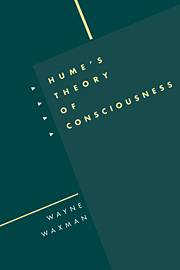Book contents
- Frontmatter
- Contents
- Preface
- Abbreviations
- Introduction: A false reason or none at all
- Part I The elements of Hume's philosophy
- Part II The cement of the universe
- 4 Beyond the senses
- 5 Custom and necessity
- Part III Vulgar fiction and philosophical fallacy
- Conclusion: The Cartesian nightmare come true
- Notes
- Bibliography
- Index
5 - Custom and necessity
Published online by Cambridge University Press: 11 September 2009
- Frontmatter
- Contents
- Preface
- Abbreviations
- Introduction: A false reason or none at all
- Part I The elements of Hume's philosophy
- Part II The cement of the universe
- 4 Beyond the senses
- 5 Custom and necessity
- Part III Vulgar fiction and philosophical fallacy
- Conclusion: The Cartesian nightmare come true
- Notes
- Bibliography
- Index
Summary
Custom: the feeling of facility
Of the three factors involved in causal inferences – remembered constant conjunction, custom, and belief – the one on which we have yet to focus is custom. Customary association is the centerpiece of Hume's theory of causation, just as of so much else in his philosophy:
Now as we call every thing CUSTOM, which proceeds from a past repetition, without any new reasoning or conclusion, we may establish it as a certain truth, that all the belief which follows upon any present impression, is deriv'd solely from that origin. (T102)
It is its belief-engendering power, its capacity to enliven ideas, that accounts for the preeminence of custom in Hume's theory of association and distinguishes it from all previous such theories:
According to my system, all reasonings are nothing but the effects of custom; and custom has no influence, but by inlivening the imagination, and giving us a strong conception of any object. (T149) Custom has two original effects upon the mind, in bestowing a facility in the performance of any action or the conception of any object; and afterwards a tendency or inclination towards it; and from these we may account for all its other effects, however extraordinary. (T422)
- Type
- Chapter
- Information
- Hume's Theory of Consciousness , pp. 164 - 200Publisher: Cambridge University PressPrint publication year: 1994



